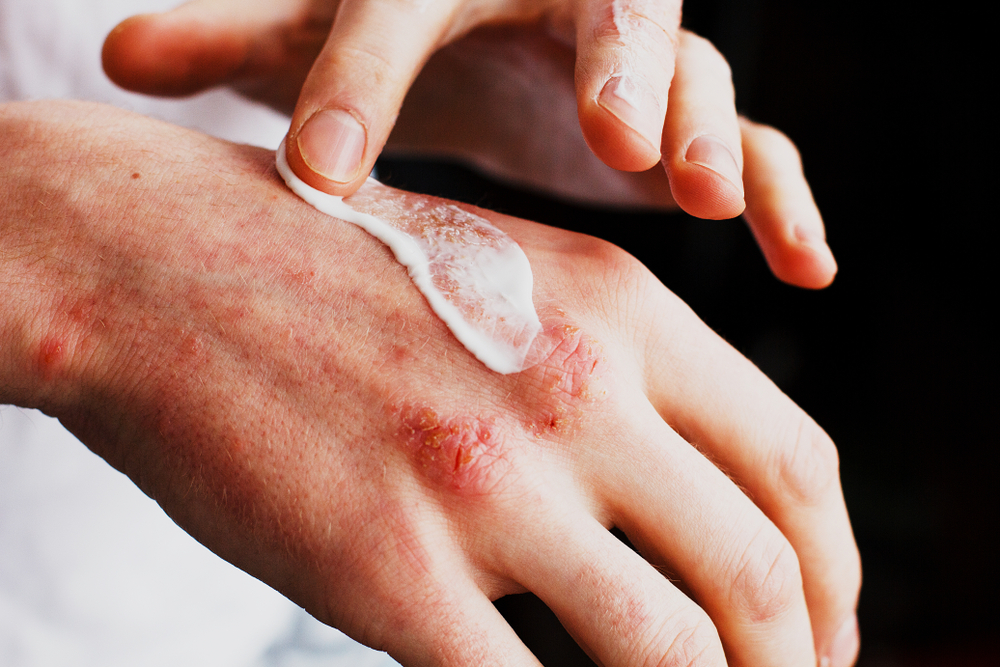
Types of Eczema
- Atopic Dermatitis: Most common form; begins in childhood and diminishes during adulthood. Many people also suffer Asthma & Hay fever along with dermatitis, which is collectively called the ‘Atopic Triad’.
- Contact Dermatitis: Caused as a reaction to substances either due to an allergen or irritant material touching the skin.
- Neurodermatitis: Skin develops itchy patches especially around arms, legs, back of the neck, genitals, and anal area. The patches become thick and scaly and could cause severe, frequent itching.
- Dyshidrotic Eczema: Being more common in women, causes small blisters on hands and feet.
- Nummular Eczema: Causes round, coin-shaped spots that look very different from other types of eczema.
- Seborrheic Dermatitis: Mainly occurs in the scalp causing scaly patches, red skin, and stubborn dandruff. It can also affect other oily areas of the body such as the face, sides of the nose, ears, eyelids, and chest.
- Stasis Dermatitis: Caused due to fluid leaking out of weakened veins into the skin. The fluid causes swelling, redness, itchiness, and pain.
Symptoms of Eczema
- Dry Skin
- Itchiness
- Red to brownish-grey patches on the hands, feet, ankle, wrists, and upper chest. In infants, the face and scalp
- Small raised bumps
- Thick, cracked, and scaly skin
- Raw, sensitive, sometimes swollen skin
Causes of Eczema
Healthy skin helps retain moisture and protects from microbes, irritants, and allergens. Eczema is believed to be triggered by an overactive immune system that responds aggressively when exposed to the irritant. Such common triggers are:
- chemicals in cosmetics
- wool
- synthetic fibers
- raised body temperature and sweating
- sudden drop in humidity
- stress
- food allergies
- animal dander.
Risk factors for eczema could be personal or family history of eczema, allergies, hay fever, or asthma.
Treatment
Since there is no defined cure for Eczema, the below are identified to relieve the symptoms:
- Self Care: reduce scratching, identify and avoid trigger factors, take shorter baths and use gentle soaps.
- Medications: emollients for dryness and topical corticosteroids for inflammation help relieve the symptoms.
- Chinese medicine: Herbal medicine, herbal teas, pills, and sometimes acupuncture and acupressure, which calm the immune system are used so that it eventually becomes less reactive.
Home Care and Prevention
Efforts towards minimizing dryness must be undertaken. Some of them are as below:
- Keep your skin moisturized and not let it dry out.
- Identifying and avoiding trigger factors.
- Taking shorter baths and using gentle soaps for bathing.
- Pat drying the skin with a soft towel post-shower.
- Since stress has an impact on immunity, reducing it helps reduce the relapse.
- Keep indoor humidity at a comfortable level as humidity is known to worsen eczema.
- Wearing cotton and soft fabrics.
There is currently no permanent cure for eczema. Treatment aims to alleviate symptoms and reduce flares of symptoms. Generally, eczema cures over time however, it exists for a lifetime for some. Proper care, avoiding trigger factors and taking routine care should help.
Use a mild cleanser and warm water. After a bath of no more than 15 minutes, rinse completely, gently pat your baby dry. Moisturize at least twice a day. When trying a new moisturizer, test it on a small area of the child’s skin first to make sure it’s well-tolerated.
Food-sensitive eczema occurs typically 6-24 hours after consumption. Foods that cause flare-ups and are to be avoided are:
- Citrus fruits
- Dairy
- Eggs
- Gluten or wheat
- Soy
- Spices like vanilla, clove, and cinnamon
- Tomatoes
- Certain nuts
Some tips to avoid eczema flare-ups at night are:
- Moisture heavily before going to bed
- Bathe lightly before going to bed as bathing helps retain some moisture
- Wrap a damp cloth around the affected areas after you apply lotion to help retain moisture
- Ditch harsh, rough blankets and use soft ones instead
- Stay away from allergens like pet dander and pollen before falling asleep
- For some people, popping antihistamines could help
- 1Mayo Clinic
- 2Medical News Today
- 3National Eczema Assoication
- 4The Hong Kong Asthma Society
- 5Medical News Today
- 6Greatist





